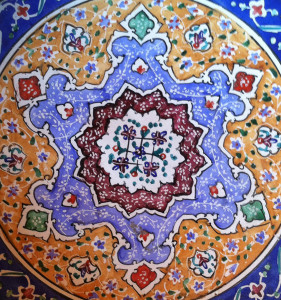Ramadan, the month of fasting, is coming to an end, and for Eid Al-Fitr, which arrives in this part of the world with tonight’s setting sun and the sighting of the new crescent moon, here is a reprint, slightly revised, of a Book of Days chapter from 2014. The sentiment is the same: Eid Mubarak. Blessed days. ~ John
My maternal grandparents came from Lucera, a small city in southern Italy that was, in the 13th century, home to a population of perhaps 60,000 Muslims that had been expelled from Sicily by Frederick II, the Holy Roman Emperor. The colony became known as Lucaera Saracenorum, or Saracen Lucera. My grandmother, a small woman whose deep olive complexion would grow darker and darker as each summer progressed, often told of long-ago Moroccan blood in our family lineage, and whether this is fact or the stuff of story is not entirely known. A good story is a good story.
But the facts do tend to support Grandma’s story. The Saracen colony at Lucera was comprised mostly of people of Northern African descent––Arabs and Berbers from Arabia, Tunisia, and Morocco. And they left their imprint on the culture of Southern Italy in subtle ways that still persist to this day linguistically (the dropping of vowels at the ends of words––which even came over to America and has influenced the Italian American communities in New York, especially) and in the way we cook. When we add fresh mint to a traditional Italian frittata or make a favorite summer zucchini dish that comes from my Grandma Cutrone, heady with the scent of vinegar and mint, it is a nod to that influence on Italy from Northern Africa.
And so I have a longstanding fascination with the cultures and traditions of Northern Africa, and am always in awe of the tile work and the paper marbling and the cinnamon-infused tagines and sweets scented with rose water. And in my mind, itself an aromatic stew that does such a good job of melding fact and fiction that I sometimes don’t know what is real and what is dream, I like to imagine myself at a feast celebrating a holiday like Eid Al-Fitr. It is the three-day celebration concluding Ramadan, the month of fasting. It is a time of prayer but a time of abundance, with good food and good aromas and good company and good deeds. It is a time meant to bring out the best in people. It begins with the sighting of the new moon’s first faint crescent, which, this year, should be just about now, this 14th night of June. Being a lunar holiday, the dates are not fixed in our Gregorian calendar, which is a solar calendar. But as the days passed last week, I watched the waning crescent moon grow increasingly slight with each passing morning near sunrise, knowing that the waxing crescent moon would soon follow, bringing these joyous days to Muslims all over the world. To them and to all of us, Eid Mubarak.
Image: Detail of a small enamel plate from Morocco that was a gift to Seth & me from someone, long ago. The memory melds with all the others in my mind, into that aromatic tagine… but that’s what makes for good cooking and for good stories: Sometimes it’s not the details so much as the whole. The patterns on this plate fascinate me.

lovely
Thanks, Karen.
Oh I do love this, John! My husband’s father always dropped those vowels — “ricott “ or “capacoll” — and I never knew why. And I have a dish very much like this, from my time living in Iran. Ah, so many stories to tell! Thank you, always, for yours.
Thank you, Cari. These things fascinate me, too!